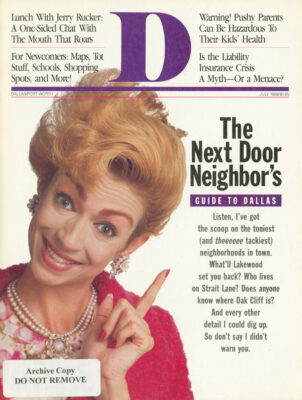We aren’t certain how the rumor began, but a decade of D staffers labored under the delusion that KVIL superjock Ron Chapman said, back in 1974. that if the magazine made it to a twelfth issue, he’d eat a copy. Now, diligent historical research brings the truth to light: the Morning Maestro actually said he’d write for D if we saw a second year. Better late than never, we say. In issue #138, we’re happy to present Ron’s insightful story, “Why Everything on Radio Happens Next.”
You pull into the office parking garage and are about to turn off the ignition when a voice from the car radio says that Bruce Springsteen will do a free concert in Dallas next month with Tina Turner and Lionel Richie. Details are coming up.
Or maybe the voice tells you that somebody in a downtown parking garage will win ten thousand dollars by simply sitting right there and listening. Contest rules right after this.
Why does nothing on radio seem to happen now? Why is it always “soon, shortly, in minutes”? The answer is called quarter-hour maintenance, and here’s how it works:
If you have one of those “ratings diaries,” they ask you to note the time you spend listening to a given station in quarter-hour increments. You listen to station KBIG from 8:00 to 8:15; you write it down; your “vote” goes into the ratings computer and your choice is projected to represent thousands who didn’t get diaries. So far, so simple.
But if you listen just five minutes into the next quarter hour, that computer treats you as a whole new listener in a new quarter hour. Therefore, if the person on the air can do anything to keep you listening just five minutes into the next quarter hour, the ratings for his station effectively double. It’s a tease, but it’s the key to healthy ratings growth.
One radio programmer (not working in this market) often gave the incorrect time on the air. At 8:18, he’d say it was 8:20, so the person with the diary wrote that he or she listened through those five critical minutes, and the station got the credit. This programmer even went so far as to invent what became known in the industry as the “rubber clock,” so he didn’t have to tell DJs to do anything so crass as lie.
The programmer got several digital clocks with the numbers on the little cards, dismantled them, and assembled a “clock” that read thusly: 8:16. . .8:17. . . 8:20. . .8:20. ..8:20. .8:21… etc. During ratings, the rubber clock became the official timepiece of his station.
I’ve always felt that the very best ratings contest would be the one in which the prize would be announced at 8:10, the rules at 8:20, the contest played at 8:40, and the results revealed at 8:50-followed, of course, at 8:55 with the obligatory “Wait till you hear what we have for you next hour!”
There’s a lot more to the science of broadcast ratings, and if the editor of D likes this contribution, perhaps we can continue in the next issue-on the newsstands shortly.
Related Articles

D CEO Award Programs
Deadline Extended: D CEO’s Nonprofit and Corporate Citizenship Awards 2024
Categories include Outstanding Innovation, Social Enterprise, Volunteer of the Year, Nonprofit Team of the Year, Corporate Leadership Excellence, and more. Get your nominations in by April 19.
By D CEO Staff

Local News
Texas Lawmakers Look to Take Zoning Changes Out of Dallas’ Hands
Dallas is taking resident input on its ForwardDallas land use plan, and a vocal group is leading the opposition. But new talk among conservative Texas policy makers indicates the decision might not be in the city's hands for long.

Healthcare
Convicted Dallas Anesthesiologist Could Face 190 Years for “Toxic Cocktails” in IV Bags
Dr. Raynaldo Ortiz worked at the Baylor Scott & White Health facility after spending time in jail for shooting a dog and while having a suspended medical license.
By Will Maddox


